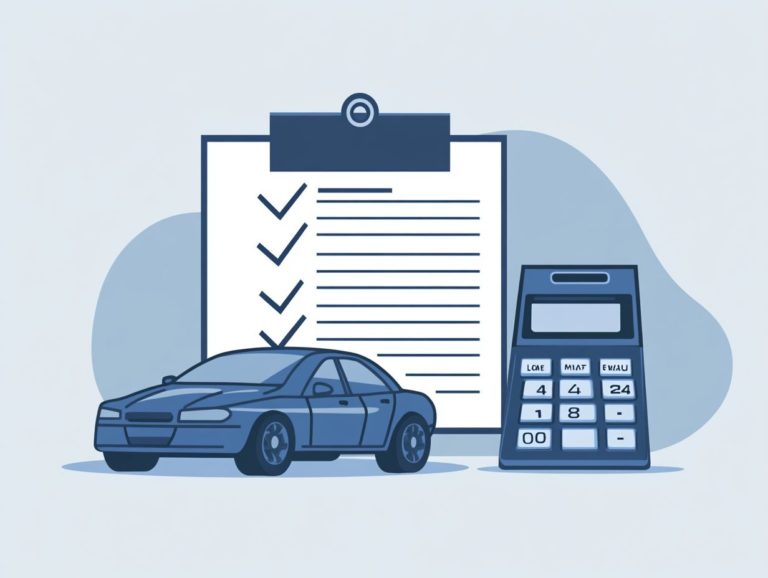5 Common Car Financing Mistakes to Avoid
When you’re financing a car, it s easy to stumble into common pitfalls that can lead to unnecessary stress and financial strain.
From neglecting to check your credit score to overlooking hidden fees, these missteps can end up costing you significantly over time.
This article delves into five prevalent errors car buyers often make during the financing process and offers valuable insights on how to navigate them effectively.
You ll also find various financing options and tips for negotiating a better deal.
Ready to take control of your car purchase? Let s jump in!
Contents
- Key Takeaways:
- 1. Not Checking Credit Score Before Applying for a Loan
- 2. Not Shopping Around for the Best Interest Rates
- 3. Choosing a Loan Term That Is Too Long
- 4. Not Considering the Total Cost of Ownership
- 5. Ignoring Hidden Fees and Charges
- What Are the Different Types of Car Financing Options?
- Frequently Asked Questions
- What are the 5 common car financing mistakes to avoid?
- Why is it important to check my credit score before financing a car?
- How can shopping around for interest rates benefit me?
- Why should I have a budget before financing a car?
- What should I look out for when reviewing the terms of a car loan?
- Why is considering the total cost of ownership important when financing a car?
Key Takeaways:

- Check your credit score before applying for a car loan.
- Shop around for the best interest rates from different lenders.
- Avoid choosing a loan term that is too long; it can lead to higher overall costs.
1. Not Checking Credit Score Before Applying for a Loan
Checking your credit score before applying for a car loan is a vital step in the car financing process. It significantly influences your chances of securing a favorable loan agreement and attractive interest rates from lenders, shaping your financial decisions and monthly payment obligations.
Your credit score is your financial reputation. Knowing it can save you money! This score doesn t just dictate the terms of your loan but also impacts the borrowing limits available to you. A higher score typically leads to lower interest rates and more favorable repayment terms, making a substantial difference in your long-term financial health.
To effectively monitor your credit score, take advantage of the annual free reports from major credit bureaus like Equifax, Experian, and TransUnion. By addressing factors that contribute to a low score such as correcting inaccuracies or reducing outstanding debts you can enhance your borrowing capabilities for the future.
2. Not Shopping Around for the Best Interest Rates
Failing to shop around for the best interest rates when considering auto financing can mean missing out on significant savings on your car loan. Exploring ways to save on auto financing costs can greatly impact both your monthly payments and total costs of ownership over the loan’s life.
Different lenders, including banks, credit unions, and online institutions, often offer a wide array of interest rates that can vary dramatically. Even car dealerships present their own financing options, sometimes flaunting promotional rates that sound enticing but may carry hidden costs or restrictions.
By securing a preapproved loan, you can gain a clearer understanding of your budget and avoid overspending. Utilizing a car payment calculator can be an invaluable tool for assessing total costs, allowing you to make informed decisions about your financial commitments and select a loan term that aligns with your long-term goals.
3. Choosing a Loan Term That Is Too Long
Choosing a loan term that s excessively long might seem tempting because of lower monthly payments, but it can backfire, leading you into negative equity and ultimately higher total costs. Negative equity means you owe more on your car loan than the car is worth.
With longer loan durations, interest accumulates over a more extended period, inflating the overall price of the vehicle. As your car depreciates more quickly than your loan balance shrinks, you could end up owing more than the car is worth, putting you at risk for negative equity.
This situation can have serious repercussions, making it hard to sell or trade in your vehicle without a significant loss.
To grasp how the length of a loan affects your financial commitments, consider using a car payment calculator. It can be an invaluable tool, helping you make informed and strategic decisions that align with your financial goals.
4. Not Considering the Total Cost of Ownership

When buying a car, look beyond the sticker price. Consider the total cost of ownership, including insurance and warranties, to avoid unexpected financial strain later.
This total cost isn’t just the purchase price. It includes ongoing expenses like fuel, maintenance, and annual registration fees that can really add up.
If you don t budget for these costs, the bills can pile up and overwhelm you. Weigh your options with a comprehensive view of long-term upkeep and repairs.
This way, you ll be fully prepared for the commitments ahead.
5. Ignoring Hidden Fees and Charges
Ignoring hidden fees when securing dealership financing can lead to unexpected costs. To avoid such pitfalls, it’s essential to consider 5 things to look for in new car financing options. These complications can impact your financial choices regarding car ownership.
You might face processing fees or surprise charges that inflate your total financing cost. These can accumulate quickly, jeopardizing your budget.
Carefully check your loan agreements to understand all terms and avoid hidden pitfalls. For those looking to finance a vehicle, following the 5 steps to take before financing a car is crucial. Knowing your borrowing limits helps you make informed decisions about vehicle ownership.
What Are the Different Types of Car Financing Options?
Several car financing options are available, tailored to different needs. These include traditional auto loans, credit union financing, and dealership financing programs.
Understanding these options helps you make informed decisions. Traditional auto loans usually offer competitive interest rates but often require high credit scores and extensive documentation.
Credit unions often provide attractive terms and lower rates, though eligibility may vary. Dealership financing is convenient with on-the-spot approval, but watch out for steeper rates and hidden fees.
Evaluate your credit situation, shop for the best loan terms, and consider seeking pre-approval before visiting the dealership.
What Factors Should Be Considered When Choosing a Car Loan?
Selecting a car loan requires careful consideration of interest rates, down payment size, credit score, and loan terms. Each factor affects your monthly payment and the total loan cost.
A higher credit score typically means lower interest rates, which can save you thousands! A larger down payment reduces the amount you need to finance, leading to lower payments and less interest over time.
Evaluate your finances, including income and debts, to understand how these factors align with your budgeting needs. This thoughtful approach empowers you to make informed decisions that support your financial goals.
How Can One Improve Their Chances of Getting Approved for a Car Loan?

Enhancing your chances of securing a car loan involves a strategic approach. Elevate your credit score, seek prequalification from various lenders, and make informed financial decisions tailored to your borrowing limits.
To begin improving your credit score, consider the following:
- Review your credit reports for any errors.
- Pay down existing debts.
- Ensure you make timely bill payments.
The importance of prequalification cannot be overstated. It allows you to gauge your financial standing without impacting your credit score.
Showcasing a solid financial history, maintaining a reasonable amount of debt compared to your income, and demonstrating responsible spending habits can position you as an attractive candidate for lenders. This ultimately leads to a more advantageous car financing experience.
What Are the Most Common Mistakes Made When Financing a Car?
Common mistakes during car financing often include:
- Overlooking your budget.
- Underestimating the impact of negative equity.
- Skimming through loan agreements.
These mistakes can lead to long-term financial headaches. Take a moment to really assess not just the monthly payment but the overall cost of ownership, including insurance, maintenance, and fuel expenses. It’s also helpful to review 5 things to know about car financing in 2024 to make informed decisions.
Many individuals forget to factor in vehicle depreciation. This oversight can leave them in a position where they owe more than the car is worth, leaving them ‘upside down’ on a loan.
Making informed choices and careful planning helps you effectively navigate potential pitfalls. Research all costs associated with the car and consider expert tips for car financing negotiation to ensure a clear understanding of the loan terms.
How Can One Avoid Falling into Debt with Car Financing?
Avoiding debt when financing a car hinges on making savvy choices. To help you make informed decisions, it’s crucial to understand the most common car buying mistakes. Start by establishing a realistic budget while considering the full spectrum of ownership costs.
Review your monthly expenses and income to pinpoint an amount you can comfortably set aside for your car purchase. Distinguish between your needs such as reliable transportation for your daily commute and your wants, like premium features or luxury models.
By prioritizing essential features while keeping an eye on your budget, you can sidestep the pitfall of overspending. This approach will ultimately lead to a smoother ownership experience.
What Are Some Tips for Negotiating a Car Loan?
Negotiating a car loan effectively can lead you to better APR rates and improved terms. This ensures you secure the best deal possible from lenders or dealership financing options.
Invest time in researching market rates for similar loans ahead of time. This equips you with invaluable information that becomes an essential negotiation tool.
Preparation is crucial. Understanding the full scope of your financial situation and the specific loan terms being offered allows you to engage in more confident discussions.
Having alternative financing options at your fingertips bolsters your negotiating power. It also provides a safety net, enabling you to walk away if the terms don t align with your expectations or seem less than favorable.
Frequently Asked Questions

What are the 5 common car financing mistakes to avoid?
The 5 common car financing mistakes to avoid are: not checking your credit score, not shopping around for interest rates, not having a budget, not understanding the terms of the loan, and not considering the total cost of ownership. For more insights, check out the new car buying mistakes to avoid.
Why is it important to check my credit score before financing a car?
Checking your credit score helps you know if you can get a loan and what interest rates are available. It also lets you fix any mistakes on your credit report that could hurt your chances.
How can shopping around for interest rates benefit me?
Shopping around helps you find the best deal. Different lenders offer different rates, so compare before you decide.
Why should I have a budget before financing a car?
A budget shows how much you can afford to pay each month. It helps you avoid overspending and falling into debt.
What should I look out for when reviewing the terms of a car loan?
Pay attention to the interest rate, loan length, and any extra fees. Make sure you understand all terms and ask questions if needed.
Why is considering the total cost of ownership important when financing a car?
The total cost of ownership includes monthly payments, insurance, maintenance, and fuel. This helps you see if the car really fits your budget.






